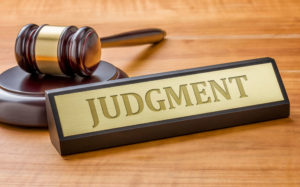How to Set Aside a Missouri Default Judgment

Under Missouri law, a court may enter a default judgment against a party for failing to appear in court or for failing to timely file an answer to a pleading.
Obtaining a Default Judgment
Obtaining a default judgment is a two-step process. In many instances, the two steps occur simultaneously. In the first step, the judge enters an interlocutory default judgment. At this stage, the party is declared to be in default, and all of the facts contained in the pleading against that party are deemed to be true.
In the second step, the pleading party must provide sufficient evidence to the judge to support a judgment for money or other relief. In many cases, an affidavit attesting to the amount of damages suffered by the pleading party is sufficient evidence. In other cases, the pleading party might prefer to conduct an evidentiary hearing on the record. At such hearing, the pleading party may present documents and testimony showing the damages suffered by that party. The party in default has the right to participate in the hearing and may demand that the amount of damages be determined by a jury.
Setting Aside a Default Judgment Within One Year
A party in default may, within a reasonable time, but not more than one year after the date of the default judgment, file a motion to set aside the default judgment. The motion must include an affidavit of the party in default (i) stating facts showing that the party in default has a good defense to the allegations in the pleading, and (ii) showing “good cause” as to why the party in default failed to appear in court or to file an answer to the pleading. Under Missouri law, “good cause” includes a mistake or conduct that is not intentionally or recklessly designed to impede the judicial process. More simply, good cause is a valid excuse as to why the party in default failed to appear in court or file an answer to the pleading. Ignorance of the legal process or neglect is generally not good cause for setting aside a default judgment.
A motion to set aside a default judgment is an “independent action”, which means the judge’s decision granting or denying the motion must be entered as a separate judgment. The parties then generally have thirty days from the date on which that judgment is entered to appeal it. The court of appeals will reverse such judgment only if the judge abused his or her discretion in denying or granting the motion. However, the trial court generally has broad discretion to set aside a default judgment and narrow discretion to deny a motion to set aside a default judgment. As such, the court of appeals is generally more likely to reverse the denial of a motion than to reverse the granting of a motion.
Setting Aside a Default Judgment After One Year
Additionally, a party in default may file a motion to set aside a default judgment more than one year after the date of the default judgment. However, a judge may set aside a default judgment pursuant to such motion only if (i) the court lacked personal jurisdiction over the party in default, (ii) the court lacked subject matter jurisdiction, or (iii) the court acted in a manner inconsistent with due process. A court typically lacks personal jurisdiction over a party not properly served with summons and petition. A court lacks subject matter jurisdiction when it is not authorized under Missouri law to adjudicate the case. Lack of certain kinds of notice might satisfy the third circumstance.
In one case decided in 2022, the St. Louis City sheriff’s deputy claimed to have served a relative at the defendant’s home in 2016. The defendant did not file and answer, and the court entered a default judgment against the defendant. Five years later, the defendant filed a motion to set aside the default judgment on the grounds that he did not live at the address at the time of service. The trial court denied the motion, and the defendant appealed. The appeals court held that the trial court lacked personal jurisdiction of defendant, as the evidence clearly showed that defendant was never served with the summons and petition, and that the judge thereby abused his discretion in denying defendant’s motion to set aside the judgment. (M.F.S.D.-C.S.E. v. J.M. (Mo. App. E.D. 2022).)
This article is for general informational purposes only, and it is not intended as legal advice. You should not rely on this article to determine whether you might succeed in setting aside a default judgment, nor should you rely on this article as a full explanation of the process of setting aside a default judgment. Rather, you should retain legal counsel experienced in setting aside default judgments to advise you as to the circumstances and merits of your situation.
Michael Sewell has successfully litigated numerous Missouri civil lawsuits since 2005. Prior to forming Sewell Law in 2015, Michael was a full-time litigator with the Clayton, Missouri law firm of Berger, Cohen, and Brandt. Please contact Michael at (314) 942-3232 or at michael@sewelllaw.net to discuss your litigation or other legal matters.
The choice of a lawyer is an important decision and should not be based solely upon advertisements.
© 2018 Sewell Law, LC


